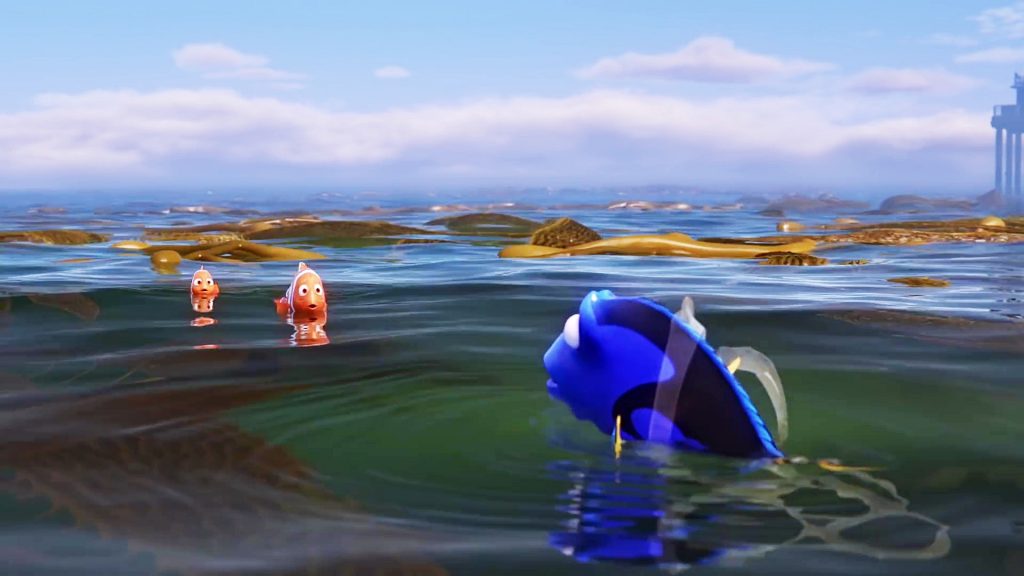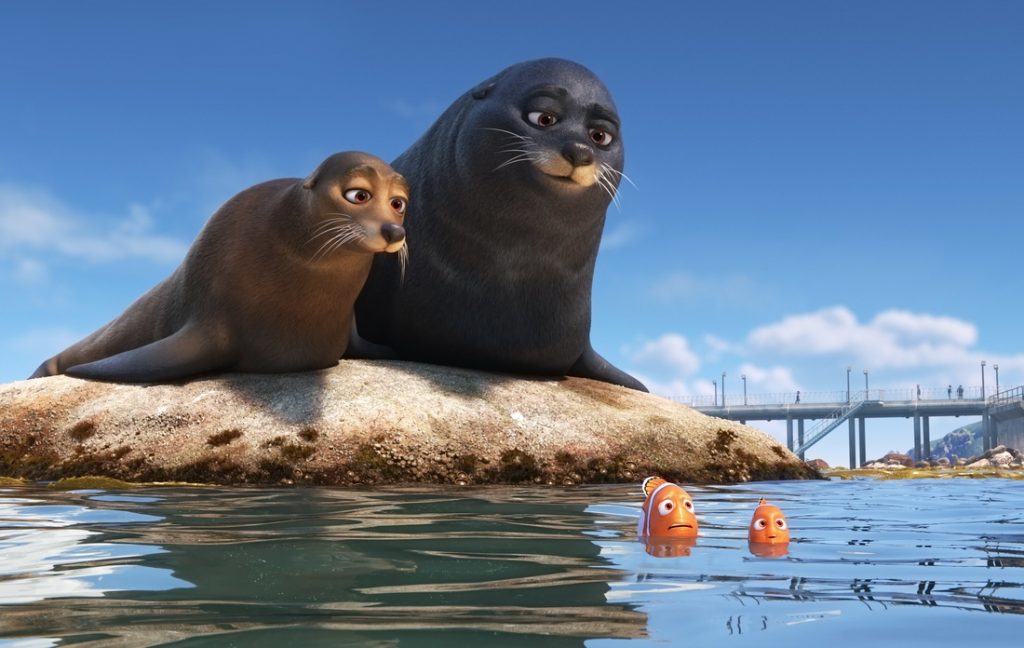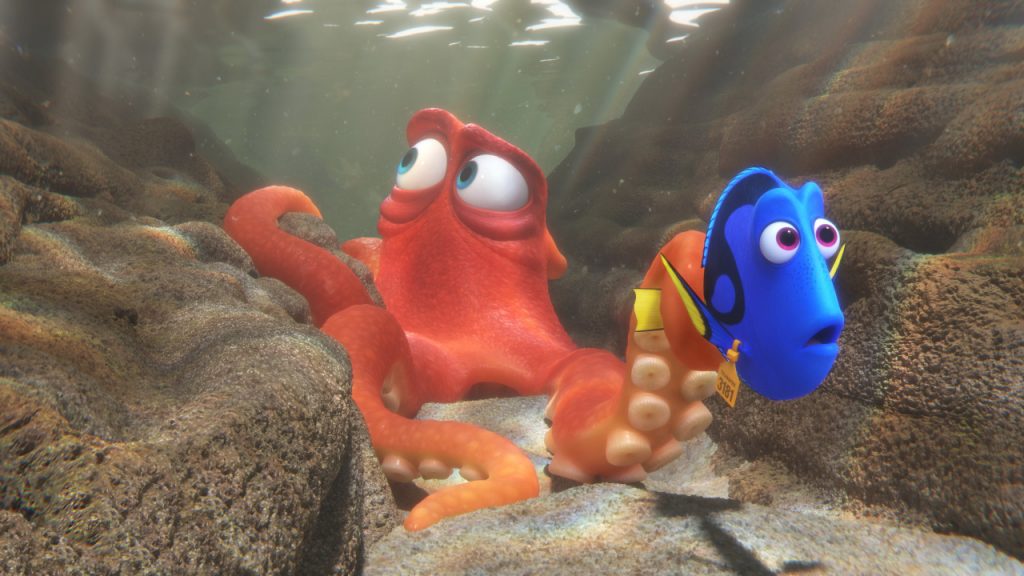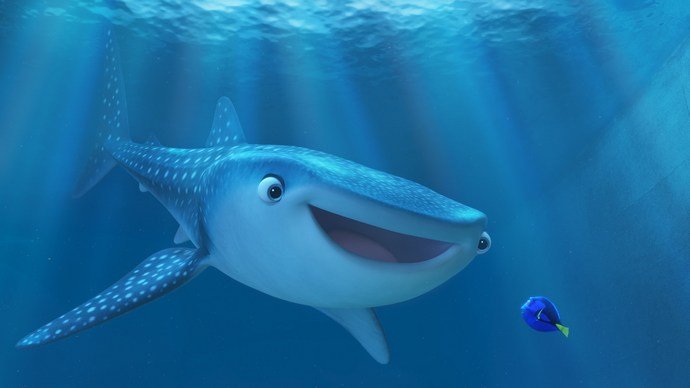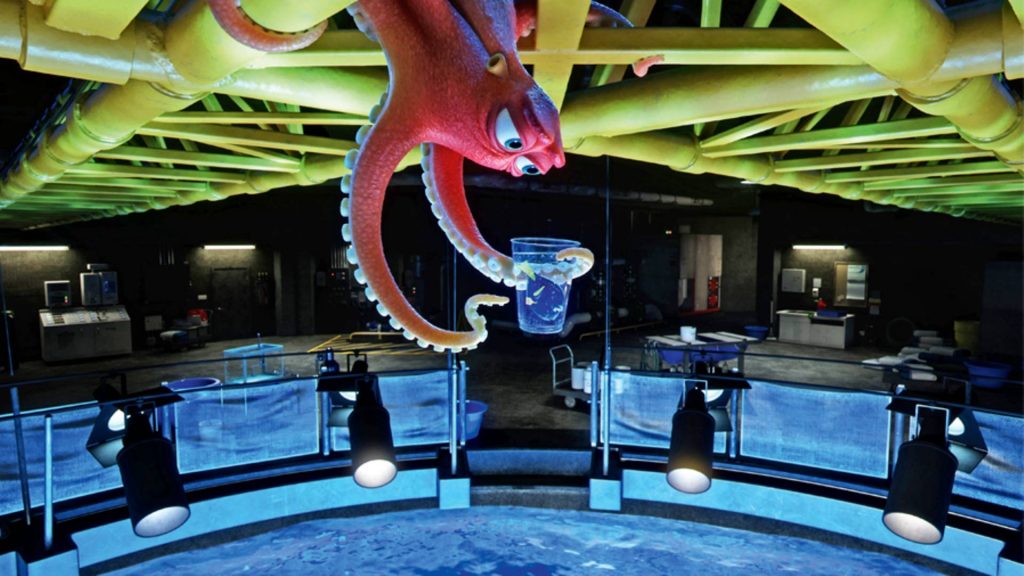 Title: Finding Dory | Rated: PG | Runtime: 97 min | Theaters nationwide
Title: Finding Dory | Rated: PG | Runtime: 97 min | Theaters nationwide
Hello, faithful readers! Do we have a treat for you – today marks the debut of MediaBrewPub’s The High-Low Report!
What is The High-Low Report? Think of it as a specialized E-Mail Throwdown. The High-Low Report is an oft-combative exchange of ideas and opinions regarding any form of media. “High-Low” represents the highbrow (Jun) and lowbrow (Andrew) members of the MBP writing team. Jun’s fondest pastime is ripping to shreds any naive soul’s attempt at storytelling. Armed with a certificate in “stick-in-his-rear,” he has no mercy for subpar dialogue or ill-conceived plot twists. Andrew, on the other hand, has never met a film he couldn’t find some good in. Amused by the simplest things, he once rated a movie five stars for the use of comedic device, man getting hit in the balls with a football. Armed with, well, nothing between his ears, he plays the whoopee cushion to Jun’s critical violin. Read on, and you’ll find the truth is actually somewhere in between.
Today, the two of them are tackling Pixar’s latest feature film Finding Dory as well as Piper, the short that runs before it. Finding Nemo opened in theaters over 13 years ago, and it’s time to see if our two writers think a sequel is worth it. WARNING: Spoilers ahead.
Andrew’s thoughts are in red, and Jun’s in blue.
Let’s get this out of the way first: Finding Dory is nowhere near as incredible as Finding Nemo. It seems unfair to compare the two since the first film is one of Pixar’s best, so to follow that up with a sequel not only is a massive undertaking, but also sounds like a terrible idea. It’s like making sequels to Terminator 2 and Die Hard – they’re both incredibly difficult (and near impossible) to match, much less top. Finding Dory neither matches nor tops its predecessor on the storytelling front, but it’s an enjoyable film that consistently hits the mark emotionally.
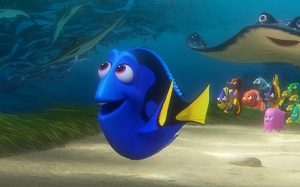 I’m very impressed with how the filmmakers handle Dory in this film. Everyone’s favorite Ellen DeGeneres-voiced blue tang is a great comedic foil to Albert Brooks’ Marlin and has an emotional beat that works really well in Finding Nemo, but I rarely saw her as anything beyond a hilarious sidekick. To develop a movie around her and her own adventure sounds like an odd choice at first, but Pixar pulls it off here with beautiful results. Her short-term memory loss that prompted grins to flash across many a face now causes tears to well, as it transcends mere comic tic to become a metaphor for disabilities. Dory’s efforts to remember – both past (shown in a number of heartbreaking flashbacks) and present – highlight the tragedy of her condition, and they make up an engrossing character arc and powerful emotional core. She’s very compelling while still being pretty funny.
I’m very impressed with how the filmmakers handle Dory in this film. Everyone’s favorite Ellen DeGeneres-voiced blue tang is a great comedic foil to Albert Brooks’ Marlin and has an emotional beat that works really well in Finding Nemo, but I rarely saw her as anything beyond a hilarious sidekick. To develop a movie around her and her own adventure sounds like an odd choice at first, but Pixar pulls it off here with beautiful results. Her short-term memory loss that prompted grins to flash across many a face now causes tears to well, as it transcends mere comic tic to become a metaphor for disabilities. Dory’s efforts to remember – both past (shown in a number of heartbreaking flashbacks) and present – highlight the tragedy of her condition, and they make up an engrossing character arc and powerful emotional core. She’s very compelling while still being pretty funny.
Part of what makes Finding Nemo so great is its band of supporting characters, and this movie has assembled one as well, consisting of both returners and newcomers. Marlin and Nemo (Hayden Rolance, replacing Alexander Gould) are back, and this time, they fill in the Marlin-Dory storyline from the first movie. I don’t think they’re as dynamic here together since neither of them really have arcs, not to mention that Nemo doesn’t have a reason to be going on this journey – he’s here for the sake of being here. A couple of minor characters from the last film show up as well, but they’re just cameos if anything. Not that they matter anyway, since the film’s location of the Marine Life Institute brings with it a host of great and memorable characters. Hank the octopus (Ed O’Neill) is a terrific foil to Dory, and most of the fun comes from the two attempting to work together. Other fun duos include a whale shark named Destiny (Kaitlin Olson) and a beluga whale named Bailey (Ty Burrell), as well as sea lions Fluke (Idris Elba) and Rudder (Dominic West). Eugene Levy and Diane Keaton voice Dory’s parents Charlie and Jenny, and they put so much heart in their roles to great effect. Special mention should also go to Sloane Murray and Lucia Geddes, who are adorable and heartbreaking as young Dory at different ages.
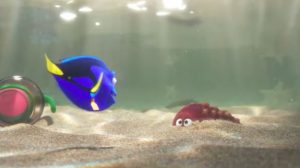 Finding Dory is a story that stalls a number of times for me, which comes from its location and themes. We get to the Institute surprisingly early on, and while it’s divided into a bunch of sub-locations that we visit, it’s still a smaller world compared to the ocean. Yes, it’s a refreshing change in scenery, but you can’t deny that the ocean’s vastness raises the stakes, and the film completely bypasses that just so the characters arrive at the Institute. I would even argue that they underutilize the Institute. Hopping from exhibit to exhibit provides plenty of entertaining sequences thanks to the escape/heist plot, but I don’t think it pauses enough to take a breath and take in the surroundings, especially later in the second act; the Institute is beautifully animated, but it’s not a dynamic environment for me. Then there’s the climax, which is absolute bonkers and frankly, not earned because it’s thematically inconsistent. It’s an anti-SeaWorld ending that the film doesn’t build up to. Hank is the only character that touches upon this captivity vs. freedom idea, but even then, he leans towards the captivity side. While Dory convinces him that freedom is more valuable, that transition plays out in such a rush, and the same applies to Destiny and Bailey as well. That climax feels detached because it’s essentially tacked on. Finding Nemo has such a wonderfully natural flow that this movie lacks, which makes the constructed nature of the story come out.
Finding Dory is a story that stalls a number of times for me, which comes from its location and themes. We get to the Institute surprisingly early on, and while it’s divided into a bunch of sub-locations that we visit, it’s still a smaller world compared to the ocean. Yes, it’s a refreshing change in scenery, but you can’t deny that the ocean’s vastness raises the stakes, and the film completely bypasses that just so the characters arrive at the Institute. I would even argue that they underutilize the Institute. Hopping from exhibit to exhibit provides plenty of entertaining sequences thanks to the escape/heist plot, but I don’t think it pauses enough to take a breath and take in the surroundings, especially later in the second act; the Institute is beautifully animated, but it’s not a dynamic environment for me. Then there’s the climax, which is absolute bonkers and frankly, not earned because it’s thematically inconsistent. It’s an anti-SeaWorld ending that the film doesn’t build up to. Hank is the only character that touches upon this captivity vs. freedom idea, but even then, he leans towards the captivity side. While Dory convinces him that freedom is more valuable, that transition plays out in such a rush, and the same applies to Destiny and Bailey as well. That climax feels detached because it’s essentially tacked on. Finding Nemo has such a wonderfully natural flow that this movie lacks, which makes the constructed nature of the story come out.
What do you think of the movie, Andrew? Knowing your tastes, I had a feeling that you’d like, even love, it.
You nailed it on the head as far as my response, Jun – I loved it. As you mentioned, the idea of Dory carrying her own film spurred on some serious personal apprehension. As much as I loved Finding Nemo, it took me some time to really grow to love everyone’s favorite Little Blue. With the original film being my all-time favorite Pixar movie, I was worried they wouldn’t do it justice and devolve the film into an inferior retelling of a similar plot or creating a goofy ensemble movie á la Dreamworks Studios. Fortunately, they put together quite the respectable sequel. And although it does not accomplish the same feat as the Toy Story films (where the sequels outperform their predecessors), I would say Finding Dory hits some notes that even the first film didn’t, making it a more significant emotional journey than the original.
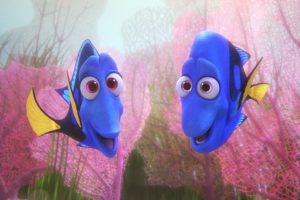 I don’t know how else to describe this film but heartbreaking. For all its hijinks, witty banter, and happy ending, the underlying background of Dory is tragic. Pixar knows we already have a relationship with her, and instead of retreading the source material, they spend twenty minutes breaking the hearts of the audience by showing the scary, lonely, and uncertain life Dory lived before finding Marlin and Nemo. To top it off, we see the two remarkably kind and charming parents that raised Dory, only to have her yanked from their lives through unknown circumstances. It’s unknown because Dory’s background unfolds in short glimpses of her past that are brought back due to mnemonic devices or Pavlovian conditioning. Watching her struggle to remember her origins makes me ashamed of the way I laughed at her condition in the first film – peeking behind the curtain of disability is rarely a fun activity but is certainly emotionally moving. While Finding Nemo hinted at the immense strength that Dory contains within her, this movie draws out not only the sheer perseverance of her spirit, but also displays how incredibly vulnerable she is. Finding Nemo may be superior in its execution of story, but the development of Dory as a character in this film is unmatched, maybe even by any of Pixar’s previous films. Finding Nemo is breathtaking, Finding Dory is moving.
I don’t know how else to describe this film but heartbreaking. For all its hijinks, witty banter, and happy ending, the underlying background of Dory is tragic. Pixar knows we already have a relationship with her, and instead of retreading the source material, they spend twenty minutes breaking the hearts of the audience by showing the scary, lonely, and uncertain life Dory lived before finding Marlin and Nemo. To top it off, we see the two remarkably kind and charming parents that raised Dory, only to have her yanked from their lives through unknown circumstances. It’s unknown because Dory’s background unfolds in short glimpses of her past that are brought back due to mnemonic devices or Pavlovian conditioning. Watching her struggle to remember her origins makes me ashamed of the way I laughed at her condition in the first film – peeking behind the curtain of disability is rarely a fun activity but is certainly emotionally moving. While Finding Nemo hinted at the immense strength that Dory contains within her, this movie draws out not only the sheer perseverance of her spirit, but also displays how incredibly vulnerable she is. Finding Nemo may be superior in its execution of story, but the development of Dory as a character in this film is unmatched, maybe even by any of Pixar’s previous films. Finding Nemo is breathtaking, Finding Dory is moving.
And as you know, because of the premium I place on characters over story, I would argue that this film might end up being more rewatchable than the first. The Dory/Hank relationship is the best cinematic odd couple pairing we’ve seen in God knows how long. Stringer and McNulty, ahem, Idris Elba and Dominic West, may be even more hilarious than the fish tank gang of the first movie. Destiny and Bailey were also wonderful additions (although I kept expecting Bailey to teach me how to be a better real estate agent), and their own personal disabilities made the trio of Dory, Destiny, and Bailey a who’s who of the kids that got picked on in the playground. Their dynamic was energetic and endearing, and helped lighten the tone in otherwise depressing circumstances.
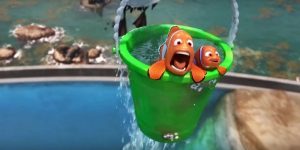 Although they do not get much screen time, Dory’s adopted family members play critical roles in showing the amazing effect her energy has on those around her. I’ve got to say, it’s like you never watched the first movie, Jun. “[Nemo is] there for the sake of being there?” Given the first story, I’d be more pissed off if Marlin left him behind – there’s no way that overprotective father goes that long without being with his son. Also, without Nemo, Marlin’s characters crosses over from grumpy old dad with a heart of gold, to that grouchy asshole with PTSD at the retirement home who bitches about everything. Nemo is the warmth that allows Marlin to look past the terrible circumstances he’s been through and fight back against his inherent cynicism.
Although they do not get much screen time, Dory’s adopted family members play critical roles in showing the amazing effect her energy has on those around her. I’ve got to say, it’s like you never watched the first movie, Jun. “[Nemo is] there for the sake of being there?” Given the first story, I’d be more pissed off if Marlin left him behind – there’s no way that overprotective father goes that long without being with his son. Also, without Nemo, Marlin’s characters crosses over from grumpy old dad with a heart of gold, to that grouchy asshole with PTSD at the retirement home who bitches about everything. Nemo is the warmth that allows Marlin to look past the terrible circumstances he’s been through and fight back against his inherent cynicism.
But it all boils back to Dory. Finding Nemo is a story about a man finding his son, Finding Dory is about a lost individual finding herself. While you were looking for a climax with a greater message, it seems you may have missed the evolution of the Dory character. There was a self-awareness that her character inherently lacked, and watching her discover herself was just as thrilling to me as the daunting obstacles she and Marlin overcame in the first film. For all its lack of polish and smaller world, Finding Dory‘s emotional landscape feels deeper than Finding Nemo‘s.
I’m sure you’ll have a response to my accusations but beyond that, what were some of the highlight moments for you during the movie?
I’ll briefly address your comments about my criticisms first. I won’t deny that Nemo appeals to Marlin’s conscience (meaning that he’s here to simply serve other characters than to really be his own), but that doesn’t change the fact that he has no arc. Also, I wasn’t looking for a climax with a “greater message” – I was pointing out that at its core lies a freedom vs. captivity theme that feels detached from the rest of the movie since there’s barely any buildup to it. I definitely see bits and pieces of Dory’s evolution in that climax, but it plays second fiddle to that anti-SeaWorld theme; in other words, the completion of her arc revolves around the theme as opposed to being in the driver’s seat. The forced and rushed nature of her spiel to Hank in the truck is evidence of that.
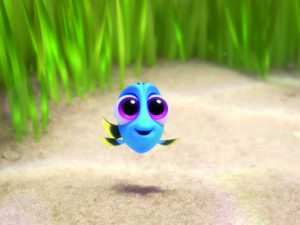 As for the highlight moments, you shouldn’t be surprised that they all center around Dory. Pixar’s power comes from the emotionally charged scenes in its movies – from the existential heart-to-heart talk between Woody and Buzz in the first Toy Story to Riley’s climactic confession to her parents in Inside Out – and it’s no different here. I really enjoyed the sequences featuring young Dory. In the ones featuring her parents, I like how there’s so much innocence and tenderness embedded there to show just how much Charlie and Jenny love their daughter, which makes their confrontation with the realities of her condition all the more heartbreaking, like when she asks them, “But what if I forget you?” Then cue the scenes where she’s on her own, where her fear and loneliness cut through like a hot knife through butter. As powerful as those scenes are, what that really takes the cake is, of course, the one where Dory finally finds her parents. The filmmakers build up to that moment masterfully, too – her focusing on a random shell, seeing another one, remembering what her parents told her, following what turns out to be a trail, heading to a shelter resembling the one from her youth, a wide shot of the shelter with all these trails of shells leading to it, a shot of two silhouettes approaching the shelter, and finally the parents revealed. At one point, I thought that it was going to be a dream sequence, and I’m so glad that it wasn’t. That’s such a tremendously crafted moment (bolstered by Thomas Newman’s poignant score), and I definitely see what you mean when you say that the movie’s emotional landscape feels deeper than that of Finding Nemo. I do wonder if your favorite scenes are the same as mine.
As for the highlight moments, you shouldn’t be surprised that they all center around Dory. Pixar’s power comes from the emotionally charged scenes in its movies – from the existential heart-to-heart talk between Woody and Buzz in the first Toy Story to Riley’s climactic confession to her parents in Inside Out – and it’s no different here. I really enjoyed the sequences featuring young Dory. In the ones featuring her parents, I like how there’s so much innocence and tenderness embedded there to show just how much Charlie and Jenny love their daughter, which makes their confrontation with the realities of her condition all the more heartbreaking, like when she asks them, “But what if I forget you?” Then cue the scenes where she’s on her own, where her fear and loneliness cut through like a hot knife through butter. As powerful as those scenes are, what that really takes the cake is, of course, the one where Dory finally finds her parents. The filmmakers build up to that moment masterfully, too – her focusing on a random shell, seeing another one, remembering what her parents told her, following what turns out to be a trail, heading to a shelter resembling the one from her youth, a wide shot of the shelter with all these trails of shells leading to it, a shot of two silhouettes approaching the shelter, and finally the parents revealed. At one point, I thought that it was going to be a dream sequence, and I’m so glad that it wasn’t. That’s such a tremendously crafted moment (bolstered by Thomas Newman’s poignant score), and I definitely see what you mean when you say that the movie’s emotional landscape feels deeper than that of Finding Nemo. I do wonder if your favorite scenes are the same as mine.
It’s funny how both of us were apprehensive about Finding Dory when it was first announced, since I would’ve guessed that you would be on board from day one. That being said, do you think Pixar will make another sequel or even a prequel? And if so, do you reckon you’d be more excited for such a prospect? Pixar is at that time now where it’s noticeably expanding on its already existing properties through prequels and sequels (three of its next four films are sequels – Cars 3, Toy Story 4, and The Incredibles 2), and I’ve read many a comment saying that the studio seems to be running out of ideas. I think that Inside Out is proof enough that Pixar still has some original stories to sink its teeth into, but one can’t help but compare its recent works to Disney’s animated slate, which has been batting a very impressive average as of late. Do you think Pixar is simply going through a phase, or is there more to it?
Maybe I’m overly simple, but I did not even think to look for a greater message in relation to SeaWorld during the movie. I saw this as much more aquarium-driven and, based off the film, that most of the animals were actually well taken care of and that the organization does its best to support the local ecosystem. I felt that Hank’s want for captivity was driven more by his need to control what he could, which is also why he pushes people away. But you know, maybe I’m just thick.
My favorite moments are categorized by fitting into emotional and funny boxes. As you’ve covered the significant emotional scenes that I enjoyed, my only addition to the group would be the moment Nemo and Marlin came to terms with the idea that they would have to say goodbye to Dory. Nemo is still a child and that’s a very tough lesson to have to learn and Pixar did a good job of capturing the bittersweet feeling that can accompany some of life’s success stories – sometimes, to accomplish something, you have to leave something else behind. I find it interesting that the two of us view the Nemo character so differently. I find Nemo to be much more important than just Marlin’s conscience and love the emotional intelligence he brings to the party. As you mentioned, everything basically pales in the light of Dory and for me, that first twenty minutes of Dory history was a home run. Pixar has really nailed the intro recipe: happiness + love + disaster = buy-in. It helps that the writing and vocal performances are generally so on point.
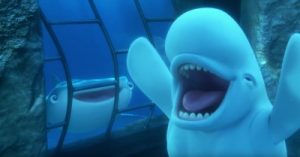 As for the funny moments, the introduction of Bailey was so great as Ty Burrell nails the awkward guy bit perfectly. When I hear him, I think of what David Schwimmer could be if he were more likable and less of a whiny bitch. The post-credits scene with the aquarium gang was a nice touch, and I was thrown off when the cast credits were shown and Willem Dafoe’s name leapt out at me like a blond chick in Compton. But the scenes that really stole the show for me were the traveling septopus scenes. The combination of perfectly timed banter with creative animation and environmental cues really provided the film with a frantic but hilarious energy. It kept me engaged and, revisiting the Finding Dory vs Finding Nemo argument, I thought they did a great job with this film of pushing the boundaries of what the animals could do in human environments. The human world always seemed to be kept at arm’s length in the first film, and here, we got to see how these characters interact with our world. I thoroughly enjoyed it.
As for the funny moments, the introduction of Bailey was so great as Ty Burrell nails the awkward guy bit perfectly. When I hear him, I think of what David Schwimmer could be if he were more likable and less of a whiny bitch. The post-credits scene with the aquarium gang was a nice touch, and I was thrown off when the cast credits were shown and Willem Dafoe’s name leapt out at me like a blond chick in Compton. But the scenes that really stole the show for me were the traveling septopus scenes. The combination of perfectly timed banter with creative animation and environmental cues really provided the film with a frantic but hilarious energy. It kept me engaged and, revisiting the Finding Dory vs Finding Nemo argument, I thought they did a great job with this film of pushing the boundaries of what the animals could do in human environments. The human world always seemed to be kept at arm’s length in the first film, and here, we got to see how these characters interact with our world. I thoroughly enjoyed it.
Looking back on my apprehension towards this sequel, I think most of it came from how much I loved the first and how skeptical I was that they could turn Dory into a character I would truly appreciate. As I mentioned, I found her amusing, but she did not steal my heart the way she did with most audiences. I wasn’t prepared for a film dedicated to Dory – I was wrong. Overall, I think Pixar has done a great job with its sequels – Toy Story got better as the series went on and while Monsters University may not have been as good as the original, it was a creative idea, and the execution was quite charming. For all the flak that the Cars movies get, you have to remember that kids just love that stuff. I see that as a little more Disney than Pixar due to the merchandising returns. I mean, you know, money. So looking at upcoming sequels, I’m actually pretty stoked. I wonder if there’s anything left in the tank for Toy Story but time and time again, Pixar has proven that Buzz and Woody are a never-ending well of quality storytelling. And Incredibles is a prime candidate for a sequel. I mean, they’re superheroes. Let’s just hope they go more Marvel and less DC. Although seeing little Jack as a brooding, angsty teenager might just be worth the price of admission if Pixar goes all Zack Snyder on us.
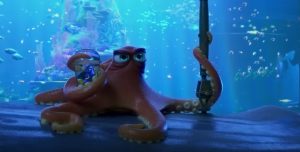 Do I see a sequel in the future for the Finding Nemo/Dory… I don’t know. I’m not sure there’s a compelling plotline to pull from what they’ve left on the table, particularly if they want to keep up the “Finding” theme. Would a young Marlin and Coral story be compelling? Not in my opinion. I think there’s two ways they could go: adult Nemo with a kid of his own or a spinoff story with Gill being the central character. I’d also be 100% on board with a Crush spinoff. The problem is, you wade dangerously into the Fox/Dreamworks realm of capitalizing off familiarity while not having enough weight to the story to create a good product. It’s kid movie empty calories. I guess I’d probably go with adult Nemo. You can add in themes of loss (death of Marlin or Dory) or switching the overprotective role from Marlin to Nemo (the classic fun grandpa bit). Still, I think this stone is pretty dry. What do you think?
Do I see a sequel in the future for the Finding Nemo/Dory… I don’t know. I’m not sure there’s a compelling plotline to pull from what they’ve left on the table, particularly if they want to keep up the “Finding” theme. Would a young Marlin and Coral story be compelling? Not in my opinion. I think there’s two ways they could go: adult Nemo with a kid of his own or a spinoff story with Gill being the central character. I’d also be 100% on board with a Crush spinoff. The problem is, you wade dangerously into the Fox/Dreamworks realm of capitalizing off familiarity while not having enough weight to the story to create a good product. It’s kid movie empty calories. I guess I’d probably go with adult Nemo. You can add in themes of loss (death of Marlin or Dory) or switching the overprotective role from Marlin to Nemo (the classic fun grandpa bit). Still, I think this stone is pretty dry. What do you think?
One pleasant surprise for me was the short ahead of the film. I have not been in theaters for a Pixar/Disney movie since Big Hero 6 so Feast was the last short I saw. I was quite caught off guard when Piper began rolling, and while I didn’t find it to be as well executed as far as story goes compared to the aforementioned Feast, the animation was breathtaking, and that little bird was very cute. I think there are few studios out there that do as remarkable of job conveying emotion and mood without the help of dialogue as Pixar. However, I’m not ready to call it a classic short along the lines of some of their previous entries. Agree?
I’ve yet to see all the Pixar movies, but I agree that they’ve generally done well when it comes to their sequels. I prefer that they tackle original stories (which is why I’m looking forward to Coco the most out of their announced upcoming titles), but for the most part, I trust Pixar to make good movies even though I don’t really eagerly anticipate them until they’re a month away from release.
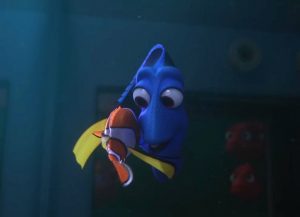 My first instinct is to say that there shouldn’t and won’t be a sequel to Finding Dory, but I had the same reaction to the idea of a sequel for Finding Nemo, and look where we are now! I’m pretty sure we can scratch a prequel story, especially if it involves a young Marlin and Coral. I could definitely see a continuation of Nemo’s story once he’s at a certain age, whether he be in his teenage years or adulthood. I imagine what Pixar’s careful not to do is retread material from their other films. That being said, I don’t think a new Nemo story would involve moving to another place (Inside Out), the death of a loved one (Up), leaving Marlin behind for college or something (Toy Story 3), etc. I kind of want to see Pixar tackle a love story since Wall-E was their last film to have one, so perhaps it could involve Nemo – or even Marlin – working out a relationship (and have real world tie-ins like online dating, breakups, and the like). Perhaps an underwater version of Boyhood featuring Nemo is on the cards (breathe easy – I’m only saying that to piss you off).
My first instinct is to say that there shouldn’t and won’t be a sequel to Finding Dory, but I had the same reaction to the idea of a sequel for Finding Nemo, and look where we are now! I’m pretty sure we can scratch a prequel story, especially if it involves a young Marlin and Coral. I could definitely see a continuation of Nemo’s story once he’s at a certain age, whether he be in his teenage years or adulthood. I imagine what Pixar’s careful not to do is retread material from their other films. That being said, I don’t think a new Nemo story would involve moving to another place (Inside Out), the death of a loved one (Up), leaving Marlin behind for college or something (Toy Story 3), etc. I kind of want to see Pixar tackle a love story since Wall-E was their last film to have one, so perhaps it could involve Nemo – or even Marlin – working out a relationship (and have real world tie-ins like online dating, breakups, and the like). Perhaps an underwater version of Boyhood featuring Nemo is on the cards (breathe easy – I’m only saying that to piss you off).
I suppose a spin-off featuring one of the supporting characters could work, though I still think it’s a stretch. If Pixar decide to replicate what they did with this movie, then a spin-off would center on a somewhat significant secondary character whom the audience finds charming. I don’t know if Crush (and by extension Squirt) fits that mold, though Gill could. I don’t know about you, but I wouldn’t mind seeing a film that centers around Hank and the shenanigans he gets himself into. Still, it’s not a project that I would 100% back, so for the most part, they should close the book on Nemo’s world.
 I actually enjoyed Piper a great deal. The animation is just gorgeous, and that shows in just how textured the animals and the world – from the sand to the washed ashore seaweed – are. It’s a fairly straightforward story, but I think the filmmakers had a neat box of tricks to work with to keep it engaging. The way they play around with editing and point of view allows the humor to land and really gets us into the baby sandpiper’s head. Speaking of which, how adorable is that thing? I almost can’t get over it. To be honest, I think this is one of Pixar’s stronger shorts; it’s quite creative in its execution, and I haven’t been this charmed by an animated short since Partly Cloudy.
I actually enjoyed Piper a great deal. The animation is just gorgeous, and that shows in just how textured the animals and the world – from the sand to the washed ashore seaweed – are. It’s a fairly straightforward story, but I think the filmmakers had a neat box of tricks to work with to keep it engaging. The way they play around with editing and point of view allows the humor to land and really gets us into the baby sandpiper’s head. Speaking of which, how adorable is that thing? I almost can’t get over it. To be honest, I think this is one of Pixar’s stronger shorts; it’s quite creative in its execution, and I haven’t been this charmed by an animated short since Partly Cloudy.
Finding Dory may not be as refined as it ought to be, but it’s a worthy and wonderfully animated sequel with considerable emotional depth. I have some gripes with it on a storytelling level, though the film’s heart remains intact, thanks to Dory’s compelling character arc as well as a host of charming and dynamic characters – particularly the new ones. Considering the apprehension I had to the idea of this movie, consider me pleasantly surprised.
Final thoughts, lowbrow?
You never cease to surprise me. I liked Piper, and it’s quite charming in its simplicity. However, as beautiful as it is, I never thought it would end up meeting the ridiculous high-brow standards you tend to place on anything cinematic. Fun stuff. It’d be interesting to compare our favorite shorts from the Pixar vault – I imagine our preferences will be quite different.
I think I’m a lot more bullish on Finding Dory than you are but, surprisingly, we probably agree a lot more than we disagree on the film. I definitely see your point when it comes to the execution of the story, particularly when compared to the excellence we saw in Finding Nemo. However, I’m more dramatically moved by the emotional notes that this film hits, which makes me more than just pleasantly surprised – I thoroughly loved this film. I’m curious to see how the movie stands up over time but because of the pacing and witty banter, I’d wager that the re-watchability factor of this film will be quite high. This may not be in the top tier of Pixar films (Finding Nemo, Up, Wall-E, etc.), but I think it’s quite solidly just below in the second tier – and maybe one of the stronger ones at that. Its imperfections take nothing away from the emotional roller coaster that’s navigated as we delve deep into the character of Dory, and I might say that the herky-jerky flow compliments her personality perfectly. High marks all around.
Andrew’s Finding Dory Rating: 4.5/5.0 | Andrew’s Piper Rating: 4.0/5.0
Jun’s Finding Dory Rating: 4.0/5.0 | Jun’s Piper Rating: 5.0/5.0
* Photos courtesy of Walt Disney Studios Motion Pictures

